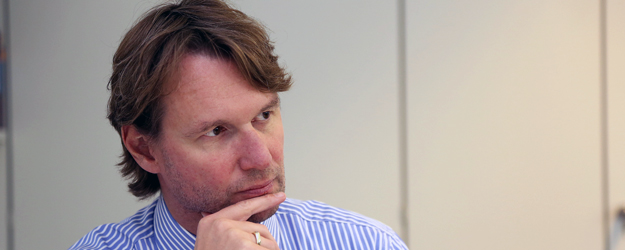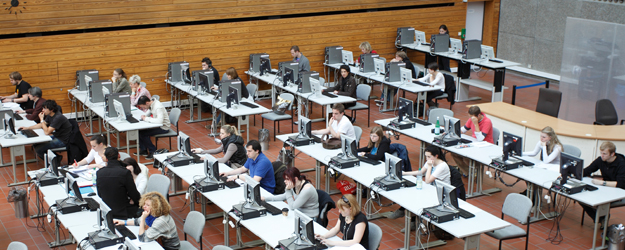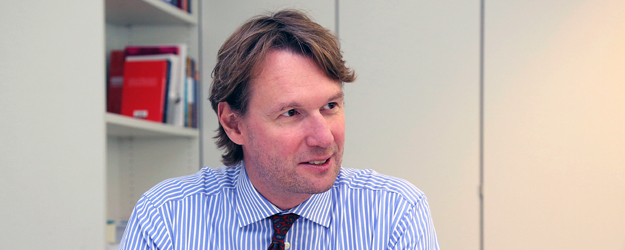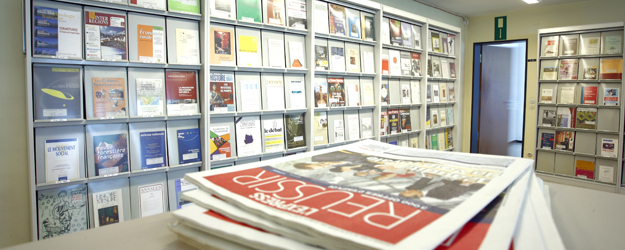14 November 2013
Research publications should be freely accessible online – this is the idea behind the 'open access' concept. The university library at Johannes Gutenberg University Mainz (JGU) has been an active supporter of this trend for years. Library director Dr. Andreas Brandtner explains where things are headed.
His office does not have piles of old books stacked in shadowy corners. No valuable first editions kept in glass display cases. Quite the contrary, the room is very tidy and bright. Dr. Andreas Brandtner believes in clean lines instead of stuffed shelves.
The Director of the Mainz University Library does not fit the stereotypical role of a librarian at all. Books are important here but not as carefully protected items to be put on display. "It's a good thing when a book falls apart," says Brandtner, smiling. "It means that the book was frequently borrowed and read and we made the right decision when we bought it."
And if the expansion of digitalization means that printed books become increasingly irrelevant, the Austrian-born Brandtner has no problem with that. "Our task is to make specialist information available to the academic community," he states matter-of-factly. However, today there is more than printed books and journals to do so.
Journals on the Internet
Open access is the name for a revolutionary concept that was born of necessity in the 1990s. Because of massively increasing costs in the magazine sector, academic journals were finding it difficult to survive. Libraries canceled their subscriptions as they simply could not afford to purchase many of the journals. The supply of printed resources for researchers and students at universities was threatened.
The practice of open access helped counter this trend. The idea was to specifically make academic journals and other publications available on the Internet at no cost to the user. Johannes Gutenberg University Mainz decided to promote the concept. Among other things, the university published a “Statement of Principles governing open access policy at JGU.”
But there was a snag: There were still costs involved because the principal journals subject the academic papers submitted to peer reviews and also have to prepare them for publication. Open access publishers charge authors a publication fee to cover these costs.
EUR 85,000 fund
"The fee charged can easily be in the region of EUR 1,500," says Brandtner. Finding this kind of money can represent a very real problem for the scientists. However, as JGU and particularly the University Library wanted to support the open access concept, a publication fund was set up. For 2013, a total of EUR 85,000 was made available. "The German Research Foundation contributes 75 percent of this while the university pays the remaining 25 percent," explained Brandtner. By early November, only EUR 17,000 was left in the fund demonstrating that this resource is widely utilized.
Brandtner is convinced that the money has been well spent. "An output of high-quality publications is important for a university." Thus the University Library also provides assistance as a publisher of open access magazines. In cooperation with the Free University of Berlin, it has developed the Open Journal Systems (OSJ), a journal management system that is already in use. The journal for interpreters TC3 – Translation: Computation, Corpora, Cognition first appeared in January 2012 as an open access publication and a little later the International Journal of Literary Linguistics followed.
However, open access is still at a very early stage. Some 2,500 specialist papers produced by medical researchers and natural scientists are published each year at JGU, of which less than 10 percent are made freely accessible. "However, the trend is growing," claimed Brandtner. One forecast sees 90 percent of publications being made available through open access by 2025. The director is skeptical when it comes to such long-term predictions, but the general tendency is apparent. "Open access is here to stay," he said, citing a journal article, which in turn is a quote from the title of an album by the German pop group Wir sind Helden.
Digital is good enough
The changes will be extensive, and Brandtner is not the only one who thinks so. "The status of a library was once determined by the size of its holdings. 3.5 million books, that sounded impressive. Today, however, such figures are irrelevant when it comes to the information supply." Brandtner actually sees a fall in the size of holdings as a sign of success.
"We are trying to get people to the point where they say: Digital is good enough." Acceptance varies by academic culture. "Humanities and legal scholars still find printed publications very important, whereas most scientists and medical researchers use a lot of digital."
Over the long term, the University Library wants to pursue an 'e-only' strategy, even though Brandtner is still quite happy to subscribe to printed journals. "Often they are offered along with the electronic versions at no additional cost. People then think: Alright we'll take it; after all, it doesn't cost anything. But expenses also arise in connection with storage and administration – that is something that is often not considered."
Nice new rooms
Open access to specialist literature on the Internet will have an impact in several areas. It will become easier to detect plagiarism in academic papers. Soon not only human users but also search engines, which are very useful when it comes to looking for copied work, will be able to draw on open access publications.
At some point Brandtner or his successor will be facing a challenge. "We will have to ask what role our library is supposed to play if everything can be accessed via the Internet." The director has an answer: "We will create spaces for studying, for working, and for discussion. We will need to provide a wide range of different services."
Perhaps these spaces will be like Brandtner's office: bright, clean, with clean lines – and almost no books.




